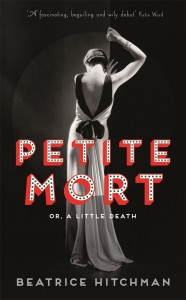 Published by Serpent’s Tail 7 March 2013
Published by Serpent’s Tail 7 March 2013
288pp, hardback, £12.99
Reviewed by Shirley Whiteside
Beatrice Hitchman’s debut is a novel of dualities, from the title (idiomatic French for orgasm), to the bisexuality of her heroine, and the doppelganger film tricks that are the speciality of her older lover. Set in Paris in the early years of the twentieth century, with the embryonic film industry as the backdrop, it tells the story of Adèle, a country girl who longs to be a silent movie star. However her first audition goes badly and instead the charismatic special effects director André Durand offers her a job in the costume department. His offer is not without strings and Adèle begins an affair with him, their trysts taking place in the empty wardrobe department after hours. Adèle’s naivety over her affair – she obviously believes herself to be a woman of the world – is sadly touching.
This is a beautifully researched story but thankfully the facts never overwhelm the fiction. Pre-Great War Paris is well drawn as are the inner workings of the Pathé film studios. Telling details, such as the swarms of flies attracted to the chemicals used in film production, add to the authenticity of the setting. It would have been good to have more about early film-making processes but Hitchman quickly moves her character out of the studio and into the claustrophobic home of her lover. Her account of how André, born in America, ended up in Paris reads like a 1980s bonk-buster novel – orphaned, adopted by rich man, has affair with avaricious step-mother, leaves to make his fortune – and jars somewhat against the more realistic back stories of other characters. The exact nature of his filmic special effects and how he achieves them is nebulous, leading André to be a rather thin character.
Adèle is wholly convincing, however, and her determination to succeed leads her to accept a job as personal assistant to André’s wife, Terpsichore, the most famous and glamorous actress of her day. The work allows Adèle to learn from a great artist and make contacts in the film industry, but also means that André has easy access to Adèle at night. All, however, is not as it seems and instead of disliking Terpsichore, Adèle falls in love with her. Terpsichore is as temperamental and demanding as any true diva should be but in private Hitchman shows the vulnerable side of a great beauty contemplating the aging process. A scandal erupts and a notorious silent movie, Petite Mort, is destroyed in a mysterious fire. In the late 1960s the film reappears and a young journalist, Juliette, interviews Adèle about the movie which is missing the key section that led to its infamy. Adèle’s expert manipulation of the younger woman is well paced as is Juliette realization that she is being used.
As a period drama this novel works well but as a mystery it is rather measured. Hitchman takes a little too long to plant the clues but the excellent final twist is both surprising and satisfying.
